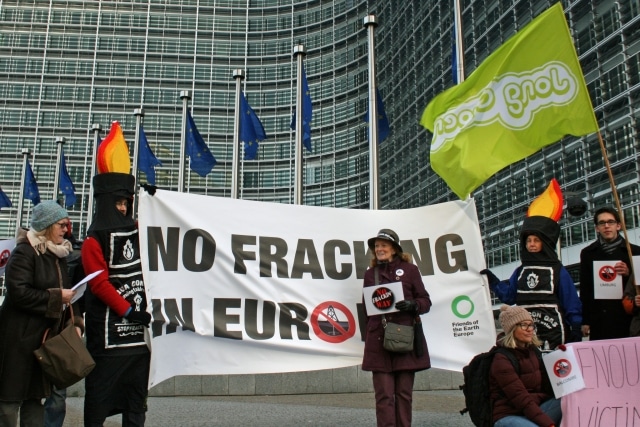The European Commission’s (EC) guidelines on fracking are being criticised as weak and vague, and have been found to be widely ignored by EU member states, according to a report published today.
The report, entitled ‘Fracking Business (as usual)’, is written by Friends of the Earth and Food & Water Europe, and states that the “weak wording” of the guidelines document is to blame for its poor implementation so far.
It also shows that there is little evidence that the 28 member states are using the guidelines “as a basis to build more stringent rules for fracking”. Instead, it argues the Commission’s report has had “no positive impact” on the way states regulate the industry and the measures they have taken to protect their citizens or the environment against any potential negative impacts.
“We have known since the European Commission’s guidelines to EU countries on fracking were published two years ago, that these recommendations were shamefully inadequate, and this report confirms that.” Green Party MEP for South East England, Keith Taylor, told DeSmog UK.
“With a government hell-bent on fracking at all costs, a few wishy-washy recommendations from the EU on how to protect the environment and their citizens from the dangerous effects of fracking simply won’t cut it.”
In addition, the report rejects the guideline’s philosophy of industry self-regulation. Antoine Simon, shale gas campaigner for Friends of the Earth, said: “Relying on industry monitoring its own impact is like putting the fox in charge of the hen house.”
Report Highlights
The European Commission’s ‘non-binding’ guidelines were a result of efforts by the UK Government and its allies lobbying to defeat legally binding regulations, according to leaked documents.
The guidelines, published in January 2014, requested all member states to implement its minimum principles within six months of publication.
But according to the responses given by member states to the EC, countries have either inadequately implemented them or have ignored the guidelines altogether. According to the 28 member states’ responses, 17 said the guidelines were irrelevant because there was no fracking going on. However, four of them had actually issued licences for fracking.
Of the four states (Poland, Lithuania, Germany and the UK) that had taken legislative or regulatory measures following the introduction of the EC’s recommendation, the report found that these measures did not actually fulfil the principles set out in the recommendation.
The guidelines state that authorities should have “adequate human, technical and financial resources to carry out their duties” and should “prevent conflicts of interest between the regulatory function of competent authorities and their function relating to the economic development of the resources.”
However, the report says the UK’s own Environmental Agency (EA) is not fulfilling this criteria. Since the beginning of 2014 the EA has been cutting staff, threating 1200 jobs in total, and it is estimated that its budget has been cut by 25 percent since 2009-10.
It also notes the potential for conflicts of interest, having invested £2.3bn of its pension fund in companies investing in fracking, including £50m of direct investments into oil and gas companies such as Shell and BP. Additionally, six months prior to his nomination by the UK government, the EA’s current Chairman, Sir Philip Dilley, was chairman of Arup – an engineering firm that had been employed to write environmental reports on fracking for Cuadrilla.
More serious concerns exist in Poland. A report published in 2014 continued to highlight the potential for corruption, after seven people from the government, industry and the Polish Geological Institute were convicted in August 2013 with 11 charges of active and passive corruption with regard to issuing licences to explore shale gas deposits in Poland.
The guidelines also advise that the industry uses ‘best available practices’, but the commission has still failed to outline what constitutes best practice.
The EC was further criticised for creating an expert group, to gather data on shale gas development in Europe and assess the most attractive fracking technology, was almost entirely made up of members of the fracking industry. According to the report, 70 percent of members either represent the fracking industry’s interests or have financial links to the fracking industry. Two-thirds of the academics and research organisations involved have links to the fracking industry while less than 10 percent of its members are from civil society.
Replicating US Mistakes
Overall, the report calls for a ban on fracking and a halt to all unconventional fossil fuels in the EU. It warns that, “Under these circumstances, we can already expect that many of the mistakes seen in the American fracking boom will be repeated here in the European Union.”
Andrew Campbell, energy spokesperson for the Green Party in the UK, agrees with the report’s conclusions. He said, “We need to keep known [fossil fuel] reserves in the ground and going for fresh reserves through shale gas is just going to be an expansion of the fossil fuel industry. No matter what regulations and guidelines are put forward they simply can’t get over that basic fact”
The EC has said that it welcomes the report, as it continues to carry out its own review of the impact of the guidelines so far. They said they would only decide whether any further action at EU level is needed, after the review is complete.
Photo: Friends of the Earth Europe via Flickr
Subscribe to our newsletter
Stay up to date with DeSmog news and alerts







